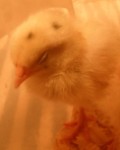Market day is a downer. Sure, there are a few pigs I was glad to see go, but I don’t think I’ve ever been closer to disavowing bacon than on market day–well, maybe I have, there was that one time I checked my blood pressure after eating a half pack of bacon.

Sometimes when I think about God, the best analogy I can think of is a farmer and a pig. A pig is a smart animal, but most farmers, current writer excluded, are exponentially smarter and somewhat omniscient (at least in terms of the pig’s day of reckoning) and generally benevolent (at least in terms of providing for the pig’s welfare). I suppose the analogy would branch from here, depending on your beliefs: If you’re a pantheist, the pig would dissolve into the ether of livermush–and so would the farmer. If you’re a Christian, in the end times, the farmer would return and call all the pigs home, which is basically a heavenly version of a pig pickin’. If you’re an atheist, then the farmer is just a figment of the pig’s imagination.
I’m not sure which branch is more ludicrous. But the thing is, life itself is ludicrous. As far as we know, in the vastness of the vast universe, we are it. Somehow, on a rock floating in space, an amoeba sprang up to form a man capable of creating livermush and then using it in analogy about an abstract concept, called God, which may be a figment of his imagination. Sure, there is a lot of chatter about UFOs these days, but if aliens turn out to be pale, anemic-looking bipeds then something fishy is going on. Aliens that look anything similar to us just wouldn’t make sense. Given a completely different set of evolutionary conditions on some other planet, I would think if we did find a crashed flying saucer that was extraterrestrial in origin, it would be more likely to be piloted by a talking sponge than little gray men.
I’m not sure how I went from pigs, to God, to aliens, but your mind goes to strange places on market day. All I know is I’m thankful for pigs and bacon and life itself, even if it is ridiculous. And I’m thankful that we live in a country where we can have ridiculous discussions and write ridiculous blog posts and think freely and eat bacon. And I’m thankful we live in a country where people can disavow bacon and join PETA if they so choose. And I’m thankful we live in a country where people can vote, whether it’s for a talking sponge or a little gray man. And I’m thankful I can live on a little farm and keep bees, the premise of which–a soft-bodied mammal keeping thousands of stinging insects–is ridiculous in and of itself. All said, I have a lot to be thankful for as I float along in this particular place on this particular rock in a vast universe of ridiculousness.





